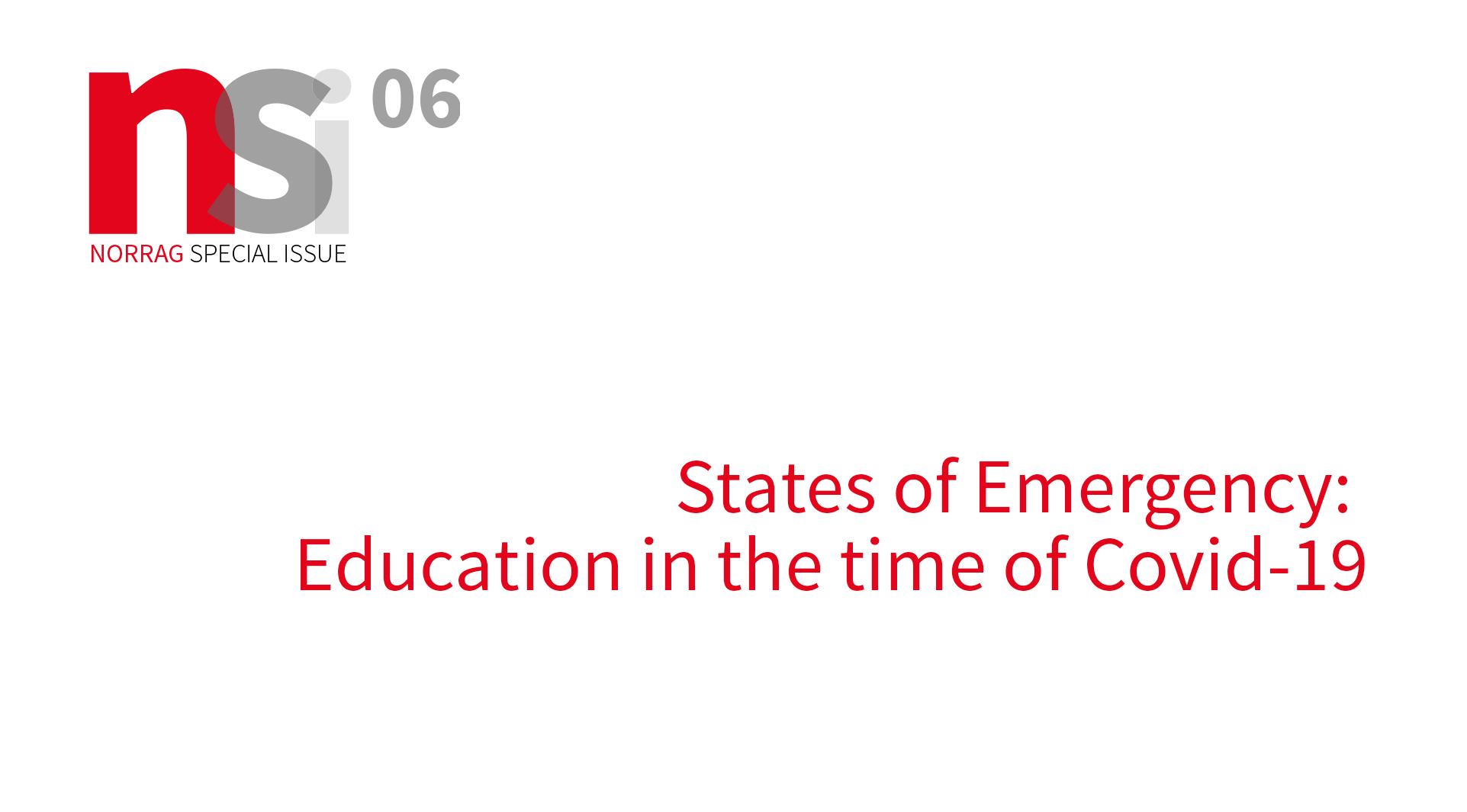Call for Contributions – NORRAG Special Issue 06: States of Emergency: Education in the time of Covid-19
Deadline extended to 18 December 2020
As the first anniversary of the novel coronavirus approaches, it is time to take stock of the pandemic’s impact on education and international development. Over the past year, schools and tertiary education institutions closed around the world, often exacerbating existing inequalities in society. Gender-based violence and hunger increased as children could neither seek refuge nor nourishment inside schools. Many people finally acknowledged that teachers are front-line care workers, raising important questions of labor rights and representation in the education sector. Some schools embraced technology to fill the lost learning time for children, but these patterns mostly benefited wealthy households and wealthy countries. No computer or internet access meant no learning for many children. Technology companies meanwhile have seen profits soar, finally realizing the long sought-after goal of some working in this business of “disrupting” the education sector. The economic impact of the pandemic will force some countries to cut education budgets in the short and long-term, despite policy affirmations of protection. These dynamics have left the future of education and those who work in and with the sector in states of emergency.
How should we respond? Policy makers and academics alike have offered different re-opening plans and guidelines. But politicized debates into the handling of the pandemic called into question many people’s belief in science and its ability to manage risk. The mutual aid societies of March morphed into anti-lockdown protests by August, although different groups may have been involved. A lack of global solidarity threatens the future of education systems, but different countries face vastly different challenges. It is too early to tell what this means for addressing the larger climate emergency that has loomed in the background of the pandemic.
How did we get here and what might the future bring? The states of emergency in education brought on by Covid-19, how people have responded, and what the implications might be, are explored in this NORRAG Special Issue. The issue is organized around six themes:
- Nature: How has the pandemic changed human relationships with nature? In what ways, where, for whom and why? If not, why not? What does the pandemic mean for the climate crisis and the way nature impacts schools/education and ideas about sustainability?
- States: Which states have been successful in minimizing the risk of the pandemic and why? Which ensemble of institutions can help protect against pandemics and disasters and what has formed these? Are some state formations more capable of managing education in times of emergencies than others? What might global cooperation in relation to education look like in the 2020s?
- Progress: Has the pandemic challenged conceptions of human progress through education? What different formulations characterize views of education for the future? How might societies progress with/through education in the aftermath of the pandemic?
- Affect: What sort of embodied experiences have occurred from the pandemic and what has been learned about education as an embodied experience? How have people found meaning in the various educational policies that have emerged to address the pandemic? What sort of anxieties exist in and through schools because of the pandemic?
- Technology: How has technology been helpful with schooling during the pandemic? Where has it been harmful? In what ways will education systems change from the new technology developed during the pandemic? What have we learned about social contexts and education technology for future disasters?
- Inequalities: How have societies and education systems become more or less unequal during the pandemic? How and why has the pandemic magnified existing inequalities, and what has helped to mitigate some of its effect? What might social justice and approaches to education equity look like after Covid-19?
Authors are encouraged to approach these themes from different perspectives and contexts. The contributions are expected to be short pieces (typically around 1200-1500 words) that can speak to a wider audience of policymakers, academics, researchers, civil society organizations, and other actors working on education. Articles should be submitted in English but if you wish to send one in French or Spanish please contact us to let us know.
Process
The Special Issue is organized around six key themes: Nature, States, Progress, Affect, Technology, and Inequalities. Each theme will have a commissioned key contribution (to be available from January) that will act as the basis for approximately five to six responses, so that the responses are in dialogue, offering different perspectives on common themes. This call for proposals seeks authors to offer/outline responses to selected themes. In preparing the papers for the special issue, authors will have access to draft versions of the key contributors’ papers.
The process for authors is as follows:
- Indicate your interest by writing a 250-word abstract by 18 December 2020 outlining the approach you will take and the context you will discuss. In the abstract, please indicate which theme(s) you will address: Nature, States, Progress, Affect, Technology, or Inequalities.
- Editors will notify selected authors by 15 January 2021, sharing the key contribution of the theme indicated.
- Selected authors will submit a draft manuscript (1200-1500 words) by 26 February 2021, connecting it to the key contribution.
- Editors’ comments will be returned by 9 April 2021.
- Final manuscripts will be submitted by 11 June 2021.
- Special issue will be published by September 2021.
Guest Editors: Will Brehm, Elaine Unterhalter, and Moses Oketch (UCL Institute of Education)
Submit abstracts to Will Brehm: w.brehm@ucl.ac.uk
Deadline for submission of abstracts: 18 December 2020

